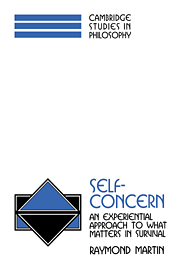Introduction
Published online by Cambridge University Press: 26 March 2010
Summary
From Plato until John Locke personal identity was explained in the West primarily by appeal to the notion of a spiritual substance or soul. From Locke until the late 1960s it was explained both in this Platonic way and by appeal to physical and/or psychological relations between a person at one time and one at another (and theorists assumed that how earlier and later persons are related to each other, through intervening persons, by itself determines whether the two are the same person). Since the 1960s there have been three major developments: First, so-called intrinsic relational views have been largely superseded by extrinsic relational (or closestcontinuer, or externalist) views, according to which what determines whether a person at one time and one at another are identical is not just how the two are related to each other but also how they are related to every other person. Second, the traditional metaphysical debate over personal identity has spawned a closely related but relatively novel debate over egoistic survival values. This debate has been over the question of whether - from what in actual, as opposed to hypothetical, circumstances would pass for a self-interested point of view - identity or other relations that do not suffice for identity do and/or should matter primarily in survival. And, third, some theorists have replaced the traditional threedimensional view of persons with a four-dimensional view, according to which the relata of the identity relation are not (whole) persons at short intervals of time but, rather, appropriately unified aggregates of personstages that collectively span a lifetime.
- Type
- Chapter
- Information
- Self-ConcernAn Experiential Approach to What Matters in Survival, pp. 1 - 9Publisher: Cambridge University PressPrint publication year: 1997
- 1
- Cited by



